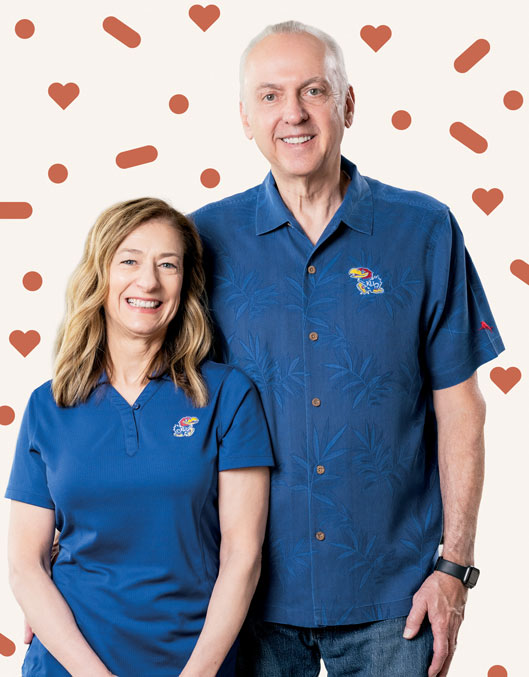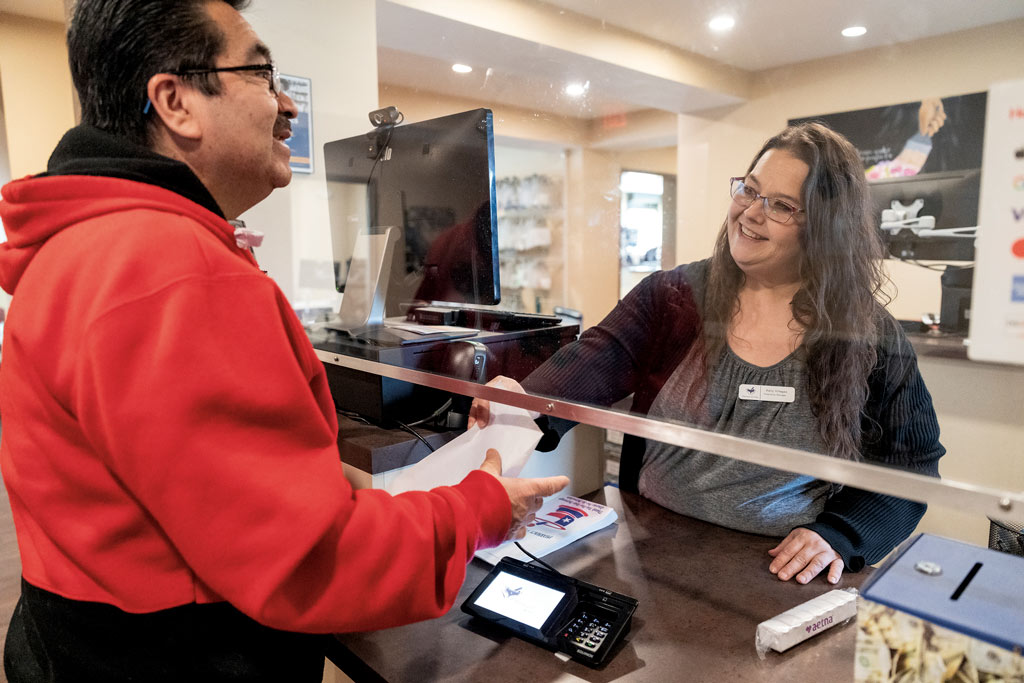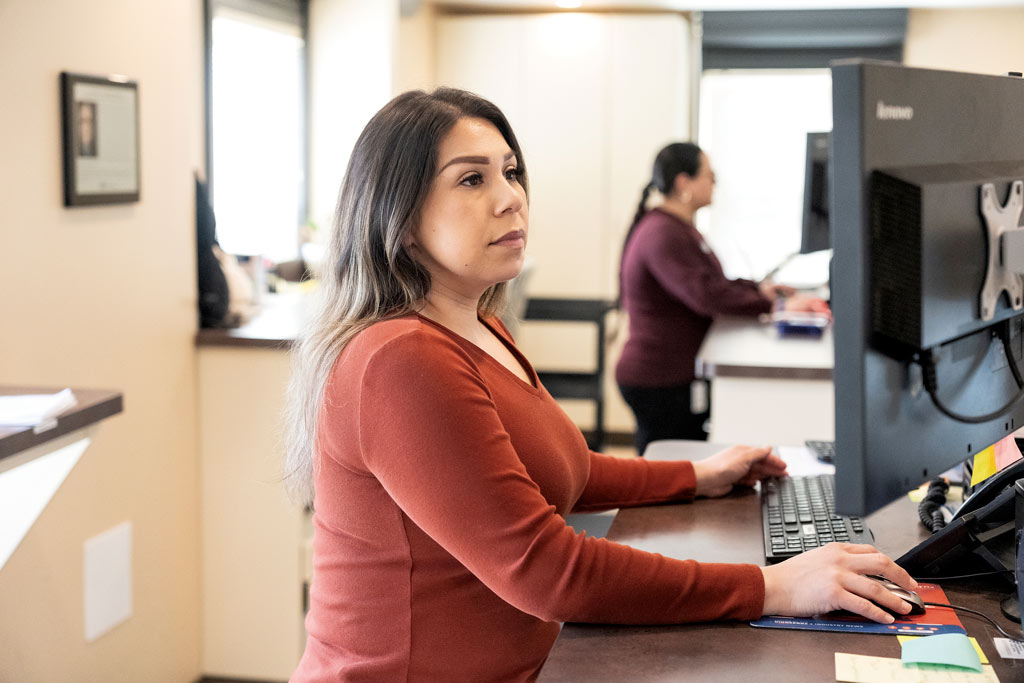Grace Notes
Issue 2, 2025

John Yost can pinpoint the date and place where he took the first step toward his transformation from successful pharmaceutical executive and scientist to fervent missionary for affordable, effective medications and co-founder of Pharmacy of Grace in Kansas City, Kansas.
The day was Sept. 16, 2001, the Sunday after the terror attacks of Sept. 11 that left many in despair, desperate for hope and community.
“My grandfather was a pastor, so my mom was a preacher’s kid, and I grew up always going to church,” recalls Yost, p’78, PharmD’09. “But then when I went away to college, I didn’t do that. I didn’t attend church. Eventually I went back several times to church, but just couldn’t find the right place to land. And then … it was the weekend after 9/11, actually … I got invited to a church I had been looking at, The Church of the Resurrection. So that weekend after 9/11, I attended. I’ve been going ever since.”
For more than a decade, John and his wife, Sara, established themselves as devoted members of their Leawood church, serving on committees and volunteering wherever needed. Yost says he began feeling the pull toward ministry, but, while still a busy pharmaceutical executive, “I didn’t have the space.” After navigating years of corporate transformations and shifting career trajectories, Yost in late 2015 signed the paperwork for his buyout package. He was free to follow his heart.
Two weeks later, the pastor who ran the church’s missions department emailed Yost to ask whether he’d be interested in volunteering. John told him he was, adding that he was available for 15 to 20 hours a week.
“He asked me, ‘How can you do that?’ I said, ‘Well, I just left the pharmaceutical industry.’ I ended up on staff, working in the missions department.”
Yost completed the United Methodist Church’s intense program for second-career lay members hoping to become licensed pastors, joined his church’s staff and began organizing mission trips so fellow congregants could do good works and meet others of a similar spirit beyond Kansas City. One such trip took Yost and his group to Cincinnati, home of the Church for all People’s nonprofit grocery store and pantry, established in 2010.
While visiting the food pantry, Yost noticed a postcard on a wall: “Charitable Pharmacy, Central Ohio.”
“And I said, ‘What’s that?’” Yost recalls. “The pastor I was with stops and says, ‘That’s something we started as a pharmacy,’ so I kept asking questions. Finally he said, ‘Are you interested in that?’” Yost replied that he’d been a doctor of pharmacy long before joining the ministry, and, yes, he was very much interested in a tour. Yost visited the 1,000-square-foot space in an old church, where couches and chairs spilled into hallways. Because the pharmacy served only the Cincinnati homeless population, anyone with an appointment could show up as soon as it opened to enjoy coffee, doughnuts and a comfortable place to rest while waiting for their name to be called.
“They had staff pharmacists and volunteer pharmacists. They had students from three different pharmacy schools. They had fellows; they had technicians. I mean, the place was buzzing.”
Crucially, Yost observed that pharmacists insisted on meeting with each patient to discuss their medications. The atmosphere reminded Yost of his training at KU, where the School of Pharmacy prepares students to foster personal connections with patients.
Unfortunately, Yost says, “this is not what people graduating get to do, especially if they go to one of the chains, where it’s, ‘Here’s your prescriptions. Have any questions for the pharmacist? Sign here.’
“So that struck me from a pharmacist level, but then from the person of service and faith level, serving those who are most in need … I mean, it just hit me. I came home talking about it, and I told my wife about it, so we went back.”
Sara Yost, PharmD’12, had been working as a computer programmer when she met her future husband, and found herself inspired to go back to school for a degree that would allow her to “focus on others.” After completing her science prerequisites at Johnson County Community College, she “decided to give pharmacy a try” at KU, and discovered it was a good fit.
“Once you’re out in the world a little bit, you see things differently,” she says of her career change. “It’s a progression in life, so to speak. You start getting it. We need to help each other. We can’t do this alone. None of us can do this alone. We need each other. So how do I contribute to that?”
She worked in retail pharmacies, starting with the Walmart in Atchison. She then became a “floater,” working in Walmarts across Olathe and Overland Park. After four years of learning the industry, she decided to combine her technology expertise with her pharmaceutical training and took a job with Overland Park-based ProPharma, which answers product questions for pharmaceutical companies, a job she still enjoys.
Sara admired her husband’s growing spirituality and took pride in his success as a pastor organizing mission trips. “I’m not sure he expected that,” she says of his assignment, “but it was actually a super fit. He did an awesome job, putting together some fabulous mission trips, connecting the right people, getting things set up, and then participating himself, too.”
When she heard about the charitable pharmacy in Ohio, Sara decided to join her husband on his next visit.
“And you know, it just blew my mind. My first thought was, ‘Why are we not doing this in Kansas City?’”
On an early spring morning in Kansas City, Kansas, an older gentleman enters Pharmacy of Grace. He steps to the reception window in the gleaming lobby that features wood floors, new furniture and community art on every wall. Kelly Villegas, who welcomes all visitors, greets him with a cheery “Hola!”
“Buenos dias,” he answers, to which Villegas replies in kind. More than 60% of the pharmacy’s patrons identify as Hispanic, and at least 45% speak only Spanish.
Tucked in at the end of a hallway opposite a health clinic run by faith-based Mercy and Truth Medical Missions, on the first floor of a sprawling former seminary dormitory, Pharmacy of Grace team members welcome patients suffering financial hardship as warmly as they do those with full insurance and the resources to afford co-payments. Since opening in 2022, it has been patronized mostly by folks in its Kansas City, Kansas, neighborhood, but it also draws patients from across the metro area, including the Missouri side, and some from as far away as rural areas south of Topeka.

Thanks to dazzling technology provided by an Overland Park company called Propio Language Services, a tablet-based app immediately connects the team with a human translator, who conducts the two-way conversation. The pharmacy has served patients speaking 15 languages other than English and Spanish, including, Arabic, Burmese, Chinese, French, Haitian, Korean, Laotian, Nepali, Somali and, with the greatest frequency behind Spanish, Swahili. The office’s technology even allows for labels to be printed in foreign languages.
“We have a gentleman who speaks Arabic, and he tries to get by using the translator service on his phone,” says Brandon Powers, PharmD’00, immunization manager and staff pharmacist. “The first time he came in, when we finally figured out he was speaking Arabic, we were able to use our service. And then when we saw that he was trying to use his phone to translate the directions on his bottle, I walked over to the system and typed in, ‘Translate Arabic’ and put the Arabic directions on his bottle. He just looked at me, and looked at the bottle, and had the biggest smile.
“The number of smiles here is a whole lot more than they are in any other retail setting, and that’s a great feeling. That’s awesome.”
Behind the window, the pharmacy professionals are all KU-trained, including Michael Fink, PharmD’00, vice president of clinical operations and the Yosts’ first hire, and student pharmacists who are working through the advanced pharmacy practice experiences required before graduating from the KU School of Pharmacy. They have at their disposal racks of the same medicines found at any high-end pharmacy, and even boast “Gracie,” an expensive, top-of-the-line robotic assistant that is far from ubiquitous in the profit-based retail world.
The atmosphere is almost too serene to be believed, certainly when compared with other pharmacies. The pace is steady yet calm. In the lobby, light Christian music greets visitors—Pharmacy of Grace might be church-inspired, but it is not church-affiliated—and the tempo of activity speaks to a resolute professionalism that aims to do better where others have fallen short.
While an especially busy retail outlet might power through hundreds of prescriptions a day, Pharmacy of Grace’s “exponential growth”—a term Michael Fink uses with a chuckle—since 2022 has expanded from about 25 a day to more than 100.
“You have a little bit more time to focus on the patients and really slow down and counsel them and go through any questions they have,” says student pharmacist Sylvia Rivera, who is completing her final rotation before earning her KU PharmD degree.
Rivera grew up in Kansas City, Kansas, and says her career goal is to return to her hometown and open another accessible pharmacy. Working on her Spanish is part of her preparation, yet she also acknowledges that the industry’s current crisis of undervalued insurance payments—a primary factor in single-provider hometown pharmacies being forced to close—likely means she’ll defer her dream of providing health care for people in need.
“I really want to be able to reach the population we are reaching here, focusing on low-income and uninsured patients,” Rivera says. “But now is not the best climate for that. I think it’s not really a good idea to be opening pharmacies.”
After completing several trips to Cincinnati, John Yost in 2016 began consulting with area professionals, some of whom became members of Pharmacy of Grace’s active, prominent board of directors. He says the question he heard most often was, “Would we be duplicating services, or is this something unique?” Once he, Sara and their collaborators were convinced they were on the right track, Yost in 2018 incorporated the pharmacy and filed for a 501(c)(3) designation as a charitable organization.
Then came the 35-day shutdown of the federal government, which pushed the pharmacy’s schedule back another six months; once renovations of their space began, COVID hit. By late 2021, the Yosts were finally in position to begin staffing, with the goal of providing competitive wages to attract the best talent.
“Every business thing I’ve ever been in, I always want to find people who are better than me and pay them for that,” John Yost says, responding to a stray comment that his employees are presumably leaving money on the table by choosing charitable health care over corporate pharmacy. “There are some nonprofits that try to underpay, but there’s a lot that actually do pay. We do. We pay to hire pharmacists. They’re our most expensive thing that we buy.”
In late 2021, they hired Fink, who at the time was in his eighth year as pharmacy manager at Cerner’s Healthe Clinic Pharmacy in KCK, which followed a decade as pharmacy manager at an Overland Park Hy-Vee and seven years at Medical Arts Pharmacy in Lawrence.
Whether intentional or otherwise, the three core founders of Pharmacy of Grace share rural backgrounds along with their deeply felt spirituality. Sara grew up on a farm in northwest Iowa; John set off for Barton County Community College in Great Bend as a criminal justice major after growing up in Alexander, a crossroads south of Hays with 100 residents at the time; and Fink hails from a farm near Herkimer, 12 miles from Marysville, in north-central Kansas.
Among Fink’s more pleasant chores was driving Grandma Erna, a German immigrant who had arrived in the U.S. in 1925, to her doctor’s appointments in Marysville, always followed by a stop at AR-EX Drug Store. While his grandmother spoke with the pharmacist, the teen chauffeur took advantage of “the all-in-one convenience shop of the time,” browsing racks of comic books and finding treats at the soda fountain.
“I just remember that the pharmacist had plenty of time to sit down with Grandma and go over her medication,” Fink says. “That’s what really drew me to pharmacy. He was able to give his patients the medications that helped them, and talk with them. She respected them, so that probably led to me respecting the pharmacist as well.”
After “much prayerful consideration,” Fink eagerly accepted the Yosts’ offer to launch Pharmacy of Grace. As with all interviewed for this story who have previous chain-store retail experience, Fink had no particular criticisms of previous employers—believing that the high volume of daily prescriptions that made their professional lives difficult had been forced upon chain stores such as Walgreen’s, Walmart and Hy-Vee by the modern pharmaceutical climate of byzantine paperwork and insufficient insurance reimbursements. He said yes to the Yosts because he cherished the opportunity to re-create what he first saw back home in Marysville: a space where pharmacists and patients actually talked with one another.
“We’re a little different. We aren’t there for volume,” Fink says. We want to make sure that we counsel the patients and that they understand their medications, particularly with those who have been diagnosed with more complex, chronic conditions such as diabetes. They’ve met with the doctor, they’ve heard the news, and then they are given medication. If that happened to me, if I was told I had a chronic condition, I would be in shock. I would need somebody to really talk it through with me. So we don’t want to hand over the medication and send them out the door. We want to talk with them about their medication and what to expect.”
Janelle Basgall Ruisinger, associate dean for academic affairs and clinical professor in the School of Pharmacy and a Pharmacy of Grace board member from 2018 through 2024, says the pharmacist-patient interaction created within Pharmacy of Grace finally replicates the atmosphere that students are taught as the ideal in their training.
“That’s part of the vision and mission of the school, to make communities healthier and to give back to Kansas,” says Ruisinger, PharmD’99. “So, yes, I do think it’s ingrained in them as they go through their education, and the fact that it’s KU alumni who had the vision for it, and have seen the vision through and continue to give back to the community, is something to be very, very proud of. Definitely a shining star for the school.”
Pharmacy of Grace’s affordable medications are made possible by corporate donors, charitable foundations and other funders, including fully insured patients who choose to fill their prescriptions at the pharmacy, indirectly supporting those who are unable to pay.

But providing steep discounts is only half the pharmacy’s battle toward fulfilling its true mission—improving patients’ health—because low-cost medications are of no use if patients take them incorrectly or not at all.
“The most expensive medication,” Fink says, “is one you don’t take correctly.”
According to Fink and the Yosts, current statistics indicate that seven of 10 prescriptions are actually filled, and only about half of those are taken properly, leaving about 30% of prescribed medications that are being taken as directed by a physician, resulting in $100 to $300 billion in losses in the U.S. alone.
“We’re trying to get these people medication that they need,” Sara Yost says, “but we’re also trying to get them to take it correctly, so that we can fulfill our mission, our purpose, of breaking the cycle of reliance on hospital emergency rooms. When we can maintain control over the disease state, we can avoid these hospital emergency room situations. It makes a lot of sense.”
A delightful detail that helps explain Pharmacy of Grace is the title given Kelly Villegas, yet another hometown employee and the first to greet patients. As “hospitality manager,” Villegas does far more than hand over bags of medications and process payments.
“It means I make sure everybody’s welcome,” she says. “Make sure that we have everything on the documentation that we need if I have to help them apply for assistance, or if I need to help them get here and home, just basically anything that that kind of patient might need assistance with. Give me one second …”
Villegas switches to fluent Spanish to assist a patient at her window, then explains that while she did go to Donnelly College for an interpreter certification, she’s otherwise self-taught. She studies with the Duolingo app, watches foreign films with English subtitles and English-language films with foreign subtitles, and, as her ace in the hole, she previously worked for a few years in fast food.
“So it’s not only the language, but also the cultures, too, that I’m pretty good on,” she says. “Along with English and Spanish, I have some French, but I’m not fluent, and I understand Portuguese. I just pick it up pretty easy, for some reason.”
Brandon Powers, the pharmacy’s immunization manager, says he enjoyed his work at his previous employer, Hy-Vee, and even found time to build relationships with patients, but the daily grind of helping fill as many as 600 prescriptions a day took a toll. When his KU classmate Mike Fink offered him a job at Pharmacy of Grace, “it was a no-brainer. I said yes as soon they offered it to me.” He is 49 years old and says he’ll “stick with this as long as it’s still operating or until I retire.”
At Pharmacy of Grace, Powers says, he finally found a professional home that reflects the job as he learned it at KU.
“None of us would have graduated without the help of others,” he says. “Basically every one of the professors there could have taken another job in their field, but they chose to give back to their community and become educators, so if there’s an opportunity for any of us to give back, that’s what we should be doing, whether you’re a doctor, a teacher, a lawyer, a pharmacist or a farmer working in the fields.
“We get so much from each other, and we should all be giving back in one way or another.”
Giving back to help others heal: the epitome of grace.
Chris Lazzarino, j’86, is associate editor of Kansas Alumni magazine.
Photos by Steve Puppe
/
